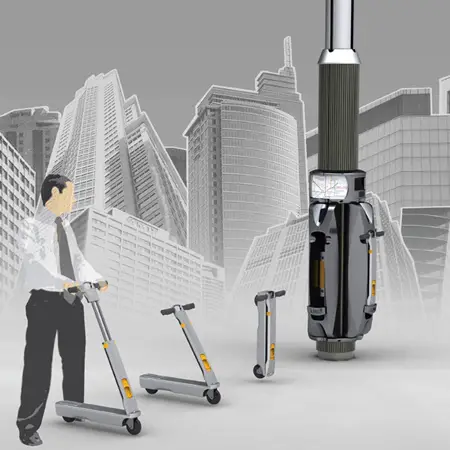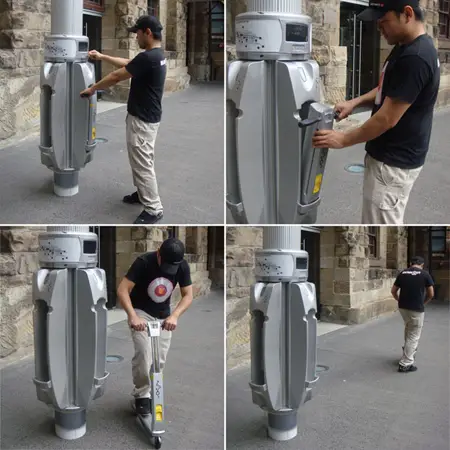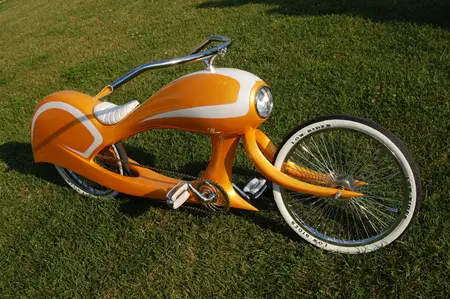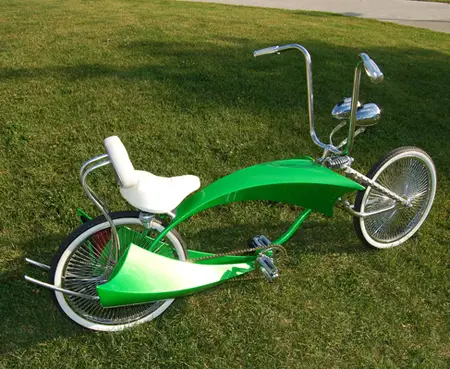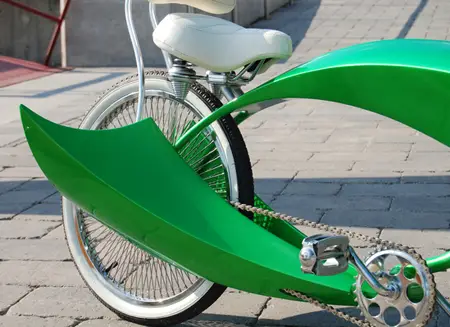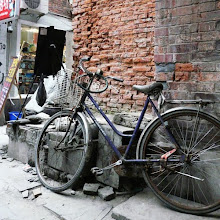
Monday, March 29, 2010
Friday, March 26, 2010
Monday, March 22, 2010
Saturday, March 20, 2010
Green Eye Candy and Orange Tequila Sunrise Bicycles
"With the sunrise orange color and the perfect white shades, the Tequila sunrise bicycle is really offering an ideal visual according to its name. Even you can compare the body of this bicycle, made of laid fiberglass over steel frame, with a rising sun. During giving the final shape, fabrication of the bicycle’s body has not been done with molds; rather the designer chose to put fiberglass over the top expanding foam. This bike may not seem quite ridable at the very first look but the designer has worked hard to make things easier. The curved handle allows the rider to maintain a comfy sitting even though the distance of the seat from the front wheel is considerably longer.
Eye Candy is a green bicycle with an innovative design and all steel body, ideal for all range of riders. The bicycle was designed to keep a lightweight bike concept in mind and therefore, it doesn’t include any unnecessary body parts. This candy green painted bicycle includes completely functional tail lights in the back pods which maybe the most uncommon feature of a bicycle. Besides, it has grilles and hand made backrest to ensure the riders comfort and fork support in the wheels to offer better durability."
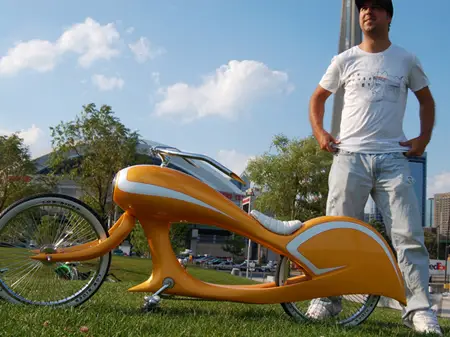
Wednesday, March 17, 2010
Melbourne Bike Sharing

Monday, March 15, 2010
Sunday, March 14, 2010
Indian Bike Sharing System
 India has its first bike-sharing service with FreMo, or Freedom to Move, in Thane, outside of Mumbai. FreMo was created by entrepreneur V. Ramesh to be a profitable business that successfully fights climate change. This service has six indoor "stations" and a fleet of 100 bikes. Subscribers get a smartcard upon registering and may also borrow a helmet before leaving a station.
India has its first bike-sharing service with FreMo, or Freedom to Move, in Thane, outside of Mumbai. FreMo was created by entrepreneur V. Ramesh to be a profitable business that successfully fights climate change. This service has six indoor "stations" and a fleet of 100 bikes. Subscribers get a smartcard upon registering and may also borrow a helmet before leaving a station.Ramesh was first exposed to bike-sharing when visiting Barcelona where he saw Bicing. "The idea appealed to me so much that I quit my job in the financial sector and devoted the whole year to ground research for this project," said Ramesh to Hindustan Times.
Being a for-profit business, FreMo has a different pricing model than is commonplace with other services. FreMo offers multiple pricing plans to provide his customers options for varying needs of use. The one-time registration fee is 499 rupees ($11 USD), an annual membership fee of 199 rupees ($4.34 USD), and a variable usage fee based on the selected plan of 0.08 - 0.30 rupees (less than $0.01) per minute.
Friday, March 12, 2010
Beijingers get back on their bikes
By Michael Bristow BBC News, Beijing |
 Competition between bike makers is becoming fierce |
Office worker David Dai is one of a growing army of Beijing residents returning to two-wheeled transport.
But the 28-year-old does not rely on his own pedal power - like hundreds of thousands of others, he has bought an electric bike.
These battery-powered, and virtually silent, machines have become increasingly common on the streets of the Chinese capital.
With roads often clogged with cars - there are now four million vehicles in Beijing - they offer a speedy way to get around.
But not everyone seems to like them: government officials are unsure about how to deal with this explosion of electric bicycles.
Congested streets
China used to be known as the "kingdom of bicycles". In the 1980s, four out of five commuters pedalled to work on them in Beijing.
But as the capital's residents became richer following economic development, they ditched their bikes for four-wheeled transport.
Recent statistics suggest that only one in five city residents now use an ordinary bicycle to travel around.
In a matter of just a few years Beijing has gone from a city with few private cars to one where traffic jams are commonplace.
But many Beijing residents are now buying electric bicycles to avoid wasting time on congested streets.
"It takes only 10 minutes to ride my electric bike from home to work," said Mr Dai.
 Hundreds of thousands of people have bought electric bicycles |
"If I took the bus, I'd have to spend time waiting for it, and then I could be trapped in a traffic jam. It could take me half an hour to make the same journey."
These bikes are on sale everywhere, with shops sometimes clustered together. Their wares are lined up on the pavement in neat rows.
Zhang Zhiyong, the manager of a store selling a brand of electric bike called "Capital Wind", said it is easy to see why sales are booming.
"Beijing is not like other smaller cities - it's big. If people ride their bicycles to work, they get really tired. If they drive to work, the roads are often congested," he told the BBC.
"But an electric bike is environmentally friendly and convenient. Promoting the use of these bikes would benefit us all."
And they are much cheaper than cars. The most expensive model in Mr Zhang's shop is only 2,680 yuan ($390:£260).
Public outcry
But not everyone is convinced by the shop owner's argument.
Many ordinary bike riders complain that the fast, silent electric bikes that now whizz about the city are a menace to other road users.
Late last year the government announced it was going to issue guidelines on what could be considered an electric bike.
Officials initially planned to bring in rules that defined an electric bike as a something weighing less than 40kg and travelling at less than 20kmh.
A bicycle that was heavier and travelled faster would be considered an electric motorbike.
 Bicycles once used to rule the roads in central Beijing |
The owners of these larger machines would have to get a licence, register their motorbikes and buy insurance.
But the government scrapped the introduction of the new guidelines after a public outcry.
"There's been a big debate in China about exactly how to deal with electric bikes," said Vance Wagner, who works for a transport research centre linked to China's Ministry of Environmental Protection.
But with the number of electric bicycles increasing all the time, the government might find it hard to put off forever a decision on how to classify them.
"Many people don't realise that the population of electric bikes is actually growing way faster than the population of cars," explained Mr Wagner.
The sale of electric bikes has slightly dropped off recently as people wait to see how the government will tackle the problem of how to define one.
But, ultimately, it is something else that might kill off sales.
Some experts believe they are a stop-gap form of transport; a link between an ordinary bike and a car.
As Beijing car owner Richard Liu put it, cars give a clue to a person's status - the more successful they are, the bigger the car they own.
"I think 80% of Chinese people want to have a car, even if they don't have much money they will buy cheaper ones," he said.
So while they are popular now, electric bicycles might one day prove as unwanted as the pedalled variety.

